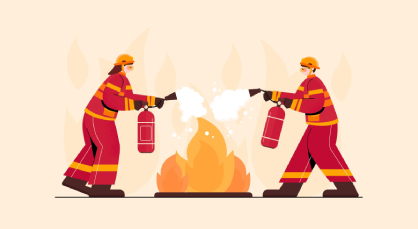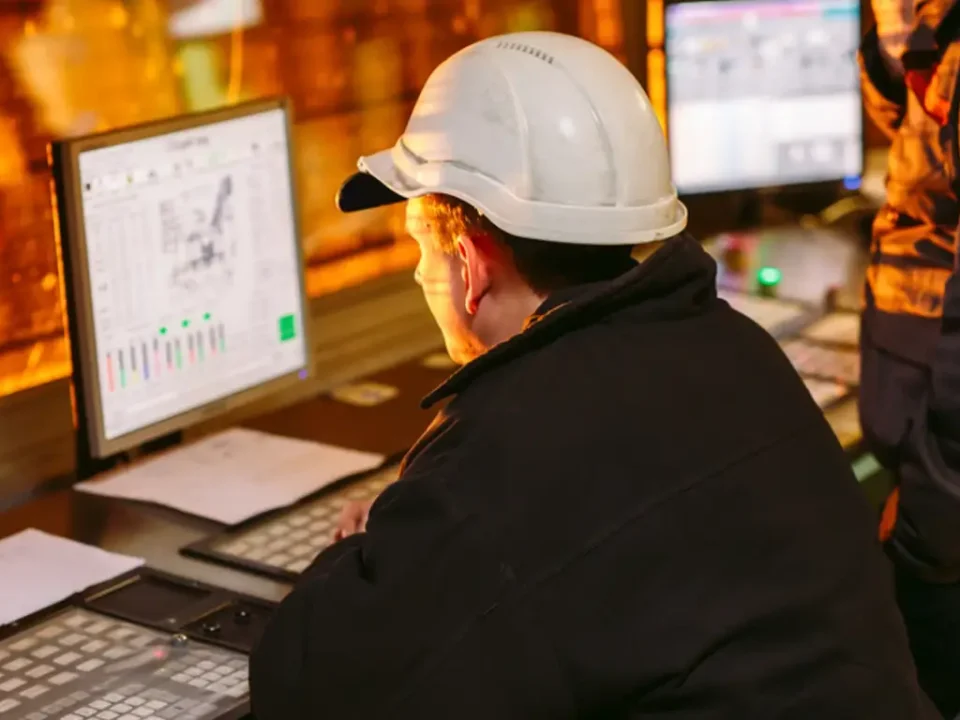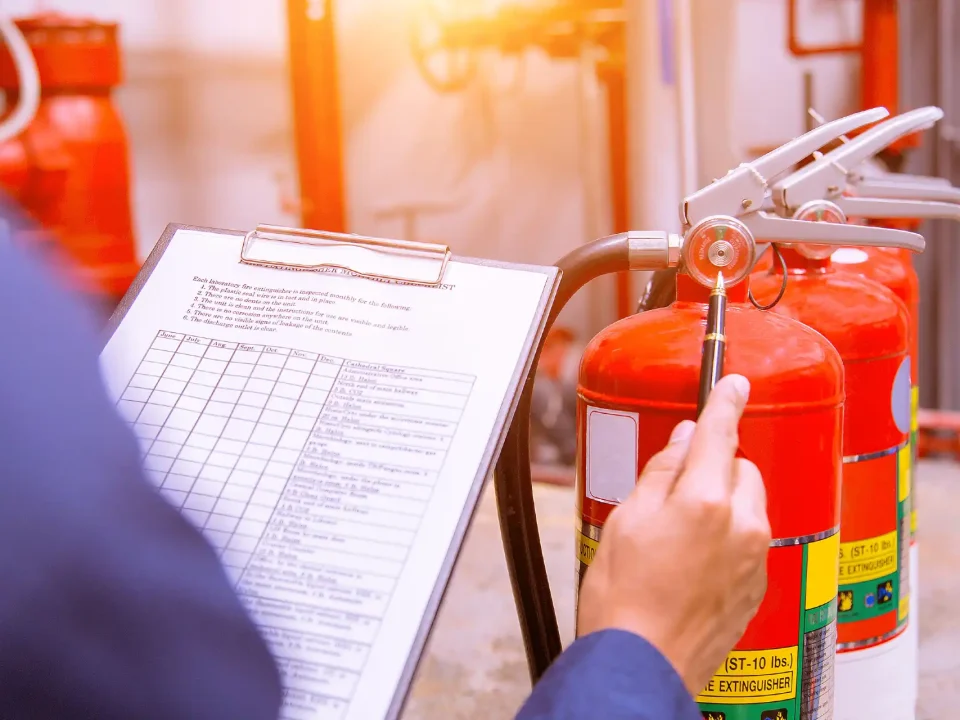The Critical Role of Fire Water Systems: Understanding the Demand Study for Indian Industrial Sectors

Hazop Study by TheSafetyMaster
December 18, 2023
Illuminating Safe Practices: Understanding the Role of Audits in Electrical Safety for Indian Businesses
December 28, 2023In this article, we delve into the critical role of fire water systems and shed light on the indispensable demand study for Indian industrial sectors. With the ever-increasing risks faced by industries, it becomes imperative to understand the intricacies of these vital systems that ensure safety and protection. Explore the pressing need for a comprehensive demand study that analyses the requirements, mitigates potential hazards, and paves the way for effective preparedness. Get ready to uncover invaluable insights, practical advice, and actionable solutions, promising an enhanced understanding of fire water systems and their significance. The safety of your industrial sector awaits.
Introduction
Fire water systems play a critical role in ensuring the safety and security of industrial sectors in India. The ability to effectively combat and control fires is of utmost importance, given the potential risks and hazards associated with various industries. However, understanding the demand study for fire water systems in Indian industrial sectors is crucial for developing robust and reliable solutions. In this article, we will explore the intricacies of fire water systems in relation to Indian industrial sectors. We will delve into the factors that influence the demand for such systems, examine the regulatory requirements set by governing bodies, discuss different types of fire water systems used, highlight design considerations and challenges faced during implementation, and showcase successful case studies. Additionally, we will look towards the future to explore emerging trends and innovations that promise further improvements in fire safety measures
Importance of Fire Water Systems in Indian Industrial Sectors
The significance of fire water systems in Indian industrial sectors cannot be overstated. These systems play a critical role in safeguarding facilities, personnel, and valuable assets from the devastating effects of fire incidents. With India’s growing industrial landscape, the demand for robust fire water systems has become more crucial than ever. In a country where industries span across diverse sectors such as manufacturing, oil and gas, power generation, and chemical processing, the potential risks associated with fire accidents are substantial. Fire water systems act as a first line of defence by effectively controlling fires and minimizing damage. They provide the necessary infrastructure to supply water at high pressures and volumes to extinguish fires swiftly and efficiently.
Furthermore, these systems go beyond mere firefighting capabilities; they also serve as an integral part of risk management strategies. By adhering to stringent safety standards and regulatory requirements, Indian industrial sectors can ensure compliance while fostering a culture of safety consciousness among employees.
The positive impact of reliable fire water systems on industrial sectors is immeasurable. Their presence instils confidence among stakeholders by demonstrating a commitment to maintaining a safe working environment. It not only safeguards live but also protects vital investments, paving the way for sustainable growth in India’s industrial landscape
Understanding the Demand Study for Fire Water Systems
Understanding the Demand Study for Fire Water Systems in Indian Industrial Sectors: The demand for fire water systems in Indian industrial sectors is a critical aspect that requires thorough analysis and understanding. A comprehensive demand study allows us to gauge the exact needs and requirements of these industries when it comes to fire safety preparedness.
One key component of the demand study is assessing the potential risks and vulnerabilities faced by different industrial sectors. This involves identifying various factors such as the nature of materials handled, operational processes, equipment used, and site layout. By examining these aspects, we can determine the level of fire protection needed and tailor fire water systems accordingly.
Another important aspect is considering historical data on fire incidents within Indian industrial sectors. Analysing past incidents helps in not only understanding common causes but also in identifying patterns or trends specific to certain industries. By incorporating this information into the demand study, we can develop targeted strategies to mitigate potential risks effectively.
Moreover, conducting surveys and consultations with industry experts further enhances our understanding of their unique requirements. These interactions provide valuable insights into specific challenges faced by industries while implementing effective fire water systems. It allows us to address their concerns and offer innovative solutions that meet both regulatory requirements and industry-specific needs.
Understanding the demand study for fire water systems plays a pivotal role in developing robust solutions tailored to Indian industrial sectors. By analysing risks, studying past incidents, and engaging with industry professionals, we can create an optimistic future where safety becomes a seamless part of every industrial operation
Factors Affecting the Demand for Fire Water Systems in Indian Industrial Sectors
Factors Affecting the Demand for Fire Water Systems in Indian Industrial Sectors: In the dynamic landscape of Indian industrial sectors, several factors influence the demand for efficient fire water systems. One crucial factor is the rapid growth and expansion of industries across the country. As new factories and manufacturing units emerge, there is an increasing need to establish robust fire water systems to ensure enhanced safety and protection against potential hazards. This demand is further fuelled by stringent regulatory requirements that mandate adequate fire safety measures, thereby driving industries to invest in reliable fire water systems.
Moreover, the geographical location of industrial facilities plays a significant role in determining the demand for fire water systems. Areas prone to natural disasters such as earthquakes or cyclones necessitate heightened preparedness for potential fires. The vulnerability of certain regions compels industries operating there to prioritize top-notch fire protection infrastructure that can swiftly respond to emergencies and mitigate risks effectively.
Furthermore, technological advancements and evolving industry standards are key factors influencing the demand for advanced fire water systems. As we witness a paradigm shift towards automation and smart infrastructure, industries are increasingly adopting innovative solutions that incorporate cutting-edge technologies like intelligent sensors, artificial intelligence, and real-time monitoring systems. These advanced features not only enhance the effectiveness of fire water systems but also optimize resource utilization while minimizing false alarms.
Overall, despite the challenges posed by their implementation and maintenance costs, it is encouraging to see how these factors are driving Indian industrial sectors towards prioritizing comprehensive fire safety measures. By embracing state-of-the-art fire water systems that align with regulatory requirements and leverage technological advancements, industries are not only safeguarding their assets but also ensuring employee safety—thus fostering a secure environment conducive to sustainable growth.
Regulatory Requirements for Fire Water Systems in India
Regulatory Requirements for Fire Water Systems in India: In the Indian industrial landscape, the implementation and maintenance of fire water systems are subject to stringent regulatory requirements. The Bureau of Indian Standards (BIS) plays a vital role in setting and enforcing these standards, ensuring that fire safety is a top priority across various industries. BIS has established specific guidelines for the design, installation, and maintenance of fire water systems to ensure their effectiveness in combating potential risks.
The regulatory framework focuses on various aspects, including the capacity of storage tanks, pipe sizing, hydrant system layout, pump specifications, and testing procedures. These regulations aim to strike a balance between ensuring adequate fire protection measures and minimizing unnecessary costs or burdens on industries. Compliance with these requirements not only promotes safety but also enhances the overall resilience of industrial sectors in India.
It is important to note that while regulatory compliance may initially seem like a burden to some industries, it ultimately contributes to creating a safer working environment. By adhering to these standards, companies can effectively mitigate potential risks and inspire confidence among employees and stakeholders alike. Additionally, embracing robust fire water systems showcases an organization’s commitment to prioritizing safety and protecting valuable assets.
Types of Fire Water Systems Used in Indian Industrial Sectors
The Indian industrial sector, known for its diversity and scale, relies on a wide array of fire water systems to ensure the safety and protection of its assets. One commonly used system is the sprinkler system, which consists of a network of pipes fitted with sprinkler heads that release water when triggered by heat. These systems are designed to control or extinguish fires in their early stages, minimizing damage and safeguarding lives. In addition to sprinkler systems, deluge systems are also prevalent in Indian industrial sectors. Deluge systems utilize open nozzles that release large quantities of water simultaneously when activated, typically used in areas where rapid fire suppression is required. Another type of fire water system commonly employed is the foam-based system. These systems combine water with specialized foam concentrates to create a foam blanket that suppresses fires by smothering them and preventing oxygen from reaching the flames. Foam-based systems are particularly effective for flammable liquid fires often found in sectors such as petrochemicals and oil refining.
Furthermore, Indian industrial sectors frequently utilize hydrant systems as an integral part of their fire water infrastructure. Hydrant systems consist of underground pipes connected to hydrant valves strategically placed throughout the facilities. These valves enable firefighters to quickly access large volumes of water for firefighting purposes.
By employing these various types of fire water systems tailored to specific needs, Indian industrial sectors demonstrate their commitment to safety and resilience in the face of potential disasters. Such proactive measures ensure not only the protection of valuable assets but also instil confidence among employees and stakeholders alike, fostering a positive working environment that thrives on preparedness and security.
Design Considerations for Fire Water Systems in Indian Industrial Sectors
When contemplating the design considerations for fire water systems in Indian industrial sectors, one must delve into the intricate details that contribute to their effectiveness. The first crucial aspect is determining the adequate storage capacity of water, considering the size and risk profile of each facility. This requires a comprehensive analysis of potential fire scenarios and an estimation of the necessary water flow rates to combat such incidents. Additionally, engineers must carefully select suitable materials for pipelines and firefighting equipment to ensure longevity and reliability under extreme conditions. Moreover, it is imperative to establish an optimal layout for these systems within industrial complexes. This involves strategic placement of fire hydrants, sprinkler systems, and monitors to provide maximum coverage while minimizing response time during emergencies. The arrangement should also consider accessibility for maintenance purposes and adhere to relevant safety codes.
Furthermore, incorporating advanced technologies can enhance the efficiency of fire water systems. Intelligent alarm systems equipped with real-time monitoring capabilities can detect abnormalities or potential hazards promptly, allowing for swift response and mitigation measures. Integration with building management systems can streamline operations and enable seamless coordination with other safety protocols.
In conclusion, meticulous attention must be given to design considerations when implementing fire water systems in Indian industrial sectors. By ensuring sufficient storage capacity, selecting appropriate materials, optimizing system layout, and integrating cutting-edge technologies, we can create robust fire protection networks that instil confidence in both workers and stakeholders alike.
Challenges in Implementing Effective Fire Water Systems in Indian Industrial Sectors
Implementing effective fire water systems in Indian industrial sectors can be a daunting task due to various challenges. One significant challenge is the lack of awareness and understanding among industry stakeholders about the importance of investing in robust fire safety measures. Many industries prioritize other aspects of their operations, often neglecting the criticality of fire water systems until an unfortunate incident occurs. Another challenge is the availability and reliability of water sources for the fire water systems. In certain regions, scarcity or inconsistent supply of water poses a significant hurdle in designing and maintaining efficient fire water systems. Additionally, ensuring proper maintenance and regular testing of these systems can be a logistical challenge for industries with limited resources or personnel dedicated to this task.
Furthermore, there may be resistance from some industry players to invest in advanced technology and innovative solutions for fire water systems. This reluctance often stems from concerns over costs and perceived complexities associated with implementing new technologies. However, by embracing technological advancements such as automated monitoring systems and remote control capabilities, industries can enhance their overall fire safety preparedness while minimizing operational disruptions.
Despite these challenges, it is essential to approach the implementation of effective fire water systems with optimism and determination. By raising awareness about the critical role these systems play in safeguarding lives, assets, and environments against potential disasters, industries can foster a culture that encourages proactive investment in robust fire safety measures. Moreover, collaboration between industry stakeholders, regulatory bodies, and technology providers will facilitate innovative solutions tailored to the unique requirements of Indian industrial sectors – ultimately leading to safer workspaces that inspire confidence among employees and investors alike.
Benefits of Investing in Robust Fire Water Systems
Investing in robust fire water systems yields multifarious benefits for Indian industrial sectors. Firstly, these systems provide an indispensable layer of protection against potential fire hazards, mitigating the risk of catastrophic accidents and safeguarding human lives. By ensuring a continuous supply of water in case of emergencies, these systems enhance the overall safety and security measures within industrial premises. Furthermore, a well-designed fire water system also helps in minimizing property damage and financial losses that can arise from fire incidents. The prompt response facilitated by such systems significantly reduces the time required to suppress fires, limiting their spread and impact on equipment, machinery, and infrastructure. This not only minimizes repair and replacement costs but also ensures uninterrupted operations for businesses.
In addition to safety advantages, investing in robust fire water systems also enhances the reputation and credibility of industrial sectors in India. Demonstrating a commitment to safety measures fosters trust among stakeholders such as employees, customers, investors, and regulatory authorities. It sends a powerful message that organizations prioritize the well-being of their workforce as well as preserving valuable assets. Ultimately, this can lead to increased business opportunities and stronger partnerships within the industry.
In summary, by investing in robust fire water systems that prioritize safety and security measures within Indian industrial sectors, businesses can protect lives, minimize property damage, reduce financial losses due to fires while bolstering their reputation among stakeholders
Case Studies: Successful Implementation of Fire Water Systems in Indian Industrial Sectors
Fire Water Systems have played a crucial role in ensuring the safety and protection of industrial sectors in India. Several successful case studies exemplify the effective implementation of these systems, showcasing their immense value. In one such case, a large petrochemical plant in western India faced a potentially catastrophic fire incident. However, due to their robust fire water system, which included high-capacity storage tanks and strategically placed hydrants, the fire was swiftly brought under control. This incident not only prevented significant damage to the plant but also demonstrated the effectiveness of well-designed fire water systems in mitigating potential disasters.
Similarly, another success story unfolded in a manufacturing facility located in southern India. The company had implemented an advanced automated fire water system with state-of-the-art detection and suppression mechanisms. When a minor fire broke out during equipment maintenance, the system detected it promptly and activated targeted sprinklers that extinguished the flames within seconds. The quick response not only saved valuable machinery but also ensured minimal disruption to production operations.
These case studies highlight how investing in reliable and efficient fire water systems can yield substantial benefits for Indian industrial sectors. By emphasizing proactive safety measures through meticulous planning and implementation, these success stories inspire other industries to prioritize the installation of robust fire water systems, ultimately safeguarding lives, assets, and business continuity across the nation’s industrial landscape.
Future Trends and Innovations in Fire Water Systems for Indian Industrial Sectors
As we delve into the future of fire water systems for Indian industrial sectors, it becomes evident that advancements and innovations are on the horizon. One notable trend is the incorporation of smart technology in fire water systems, enabling real-time monitoring and control. Imagine a system that can detect potential fire hazards, automatically activate sprinklers, and alert authorities within seconds, minimizing damage and enhancing safety measures. Furthermore, researchers are exploring sustainable solutions for fire water systems. They are developing techniques to harvest rainwater or treat wastewater to make it suitable for firefighting purposes. This not only conserves precious resources but also promotes environmental consciousness within industrial sectors.
Additionally, the integration of artificial intelligence (AI) in fire water systems shows great promise. By analysing historical data and patterns, AI algorithms can predict potential fire risks more accurately. This predictive capability allows for proactive measures to be taken beforehand, reducing the occurrence of fires and ensuring timely response when needed.
The future of fire water systems in Indian industrial sectors is undoubtedly bright. The integration of smart technology, sustainable practices, and AI-driven insights will revolutionize how we address fire safety concerns. With these advancements at hand, we can confidently envision a future where fires in industrial settings become an increasingly rare occurrence – ultimately safeguarding lives, protecting assets, and fostering a thriving environment for businesses to flourish with peace of mind.
Conclusion
The critical role of fire water systems in Indian industrial sectors cannot be overstated. Through this comprehensive analysis of the demand study, we have gained valuable insights into the factors influencing the need for robust fire water systems and the challenges faced in their implementation. Despite these challenges, it is encouraging to see how industries are actively investing in advanced fire water systems, ensuring the safety of their personnel and assets. As we embrace future trends and innovations in this field, we can look forward to a safer and more resilient industrial landscape, where fires are effectively mitigated, leaving behind a sense of security and optimism for all stakeholders involved.




